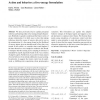Free Online Productivity Tools
i2Speak
i2Symbol
i2OCR
iTex2Img
iWeb2Print
iWeb2Shot
i2Type
iPdf2Split
iPdf2Merge
i2Bopomofo
i2Arabic
i2Style
i2Image
i2PDF
iLatex2Rtf
Sci2ools
104
click to vote
BC
2010
2010
Action and behavior: a free-energy formulation
We have previously tried to explain perceptual inference and learning under a free-energy principle that pursues Helmholtz's agenda to understand the brain in terms of energy minimization. It is fairly easy to show that making inferences about the causes of sensory data can be cast as the minimization of a free-energy bound on the likelihood of sensory inputs, given an internal model of how they were caused. In this article, we consider what would happen if the data themselves were sampled to minimize this bound. It transpires that the ensuing active sampling or inference is mandated by ergodic arguments based on the very existence of adaptive agents. Furthermore, it accounts for many aspects of motor behavior; from retinal stabilization to goal-seeking. In particular, it suggests that motor control can be understood as fulfilling prior expectations about proprioceptive The free-energy principle is an attempt to explain the structure and function of the brain, starting from the fa...
Related Content
| Added | 28 Feb 2011 |
| Updated | 28 Feb 2011 |
| Type | Journal |
| Year | 2010 |
| Where | BC |
| Authors | Karl J. Friston, Jean Daunizeau, James Kilner, Stefan Kiebel |
Comments (0)

